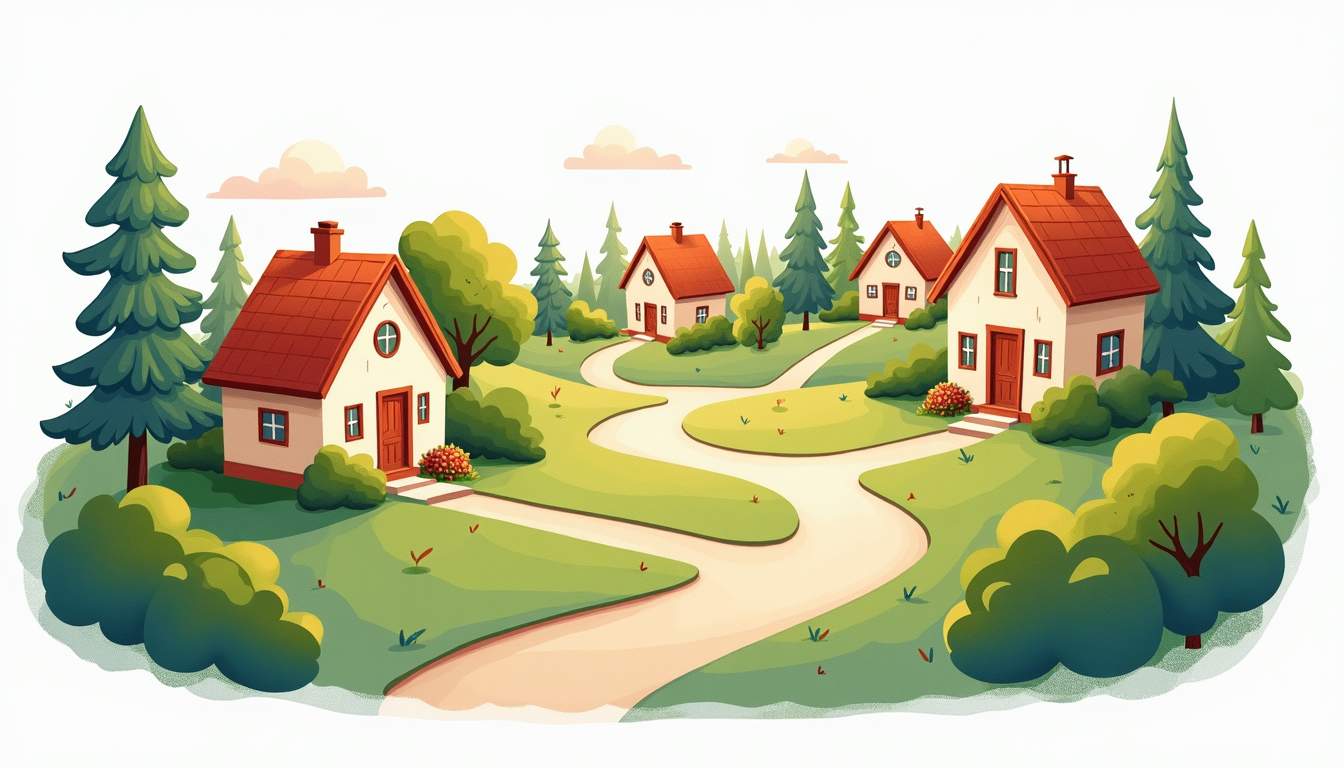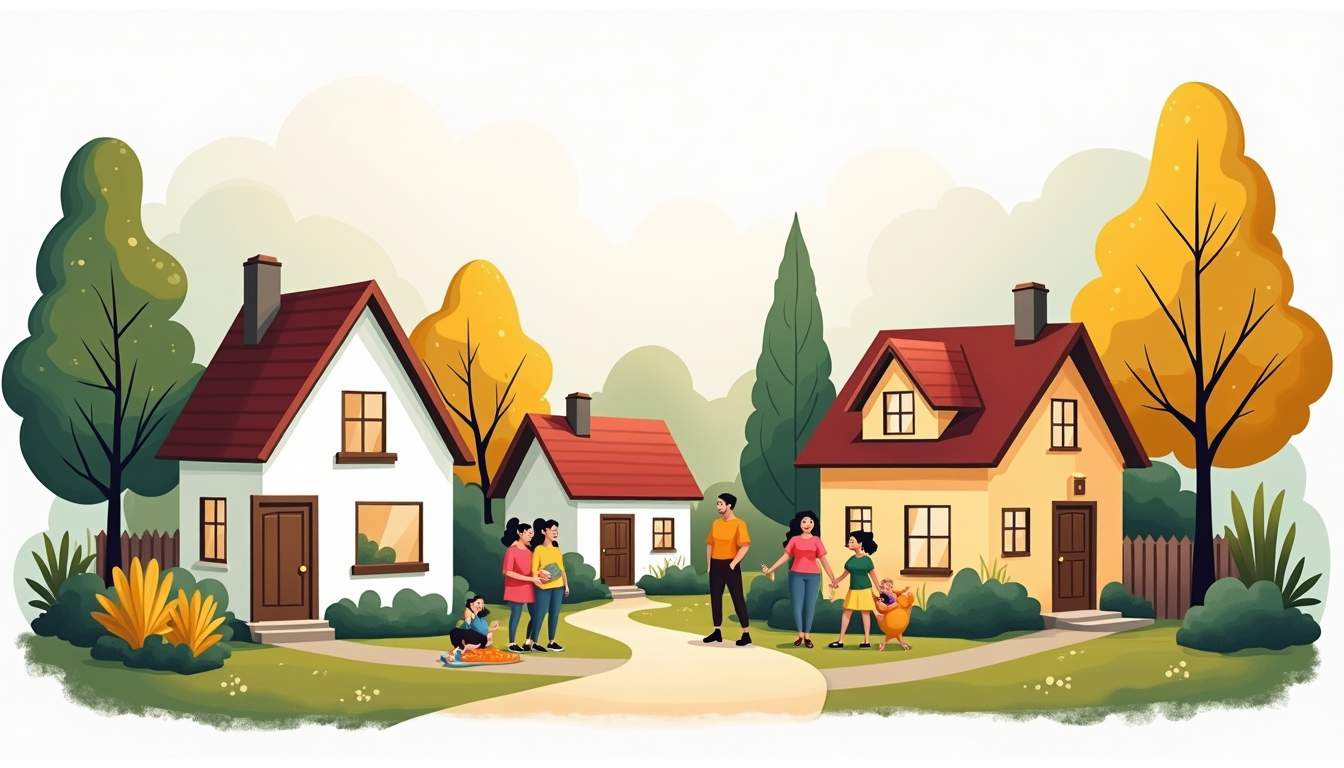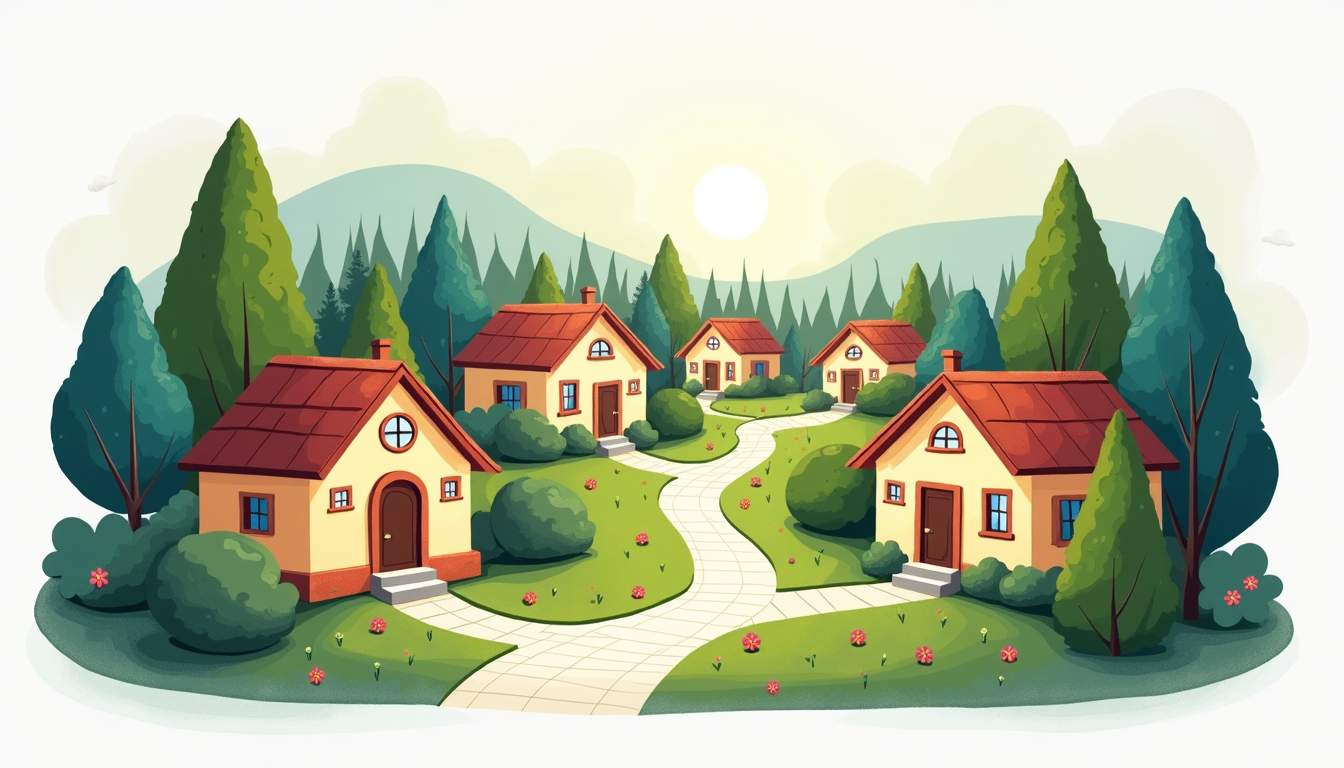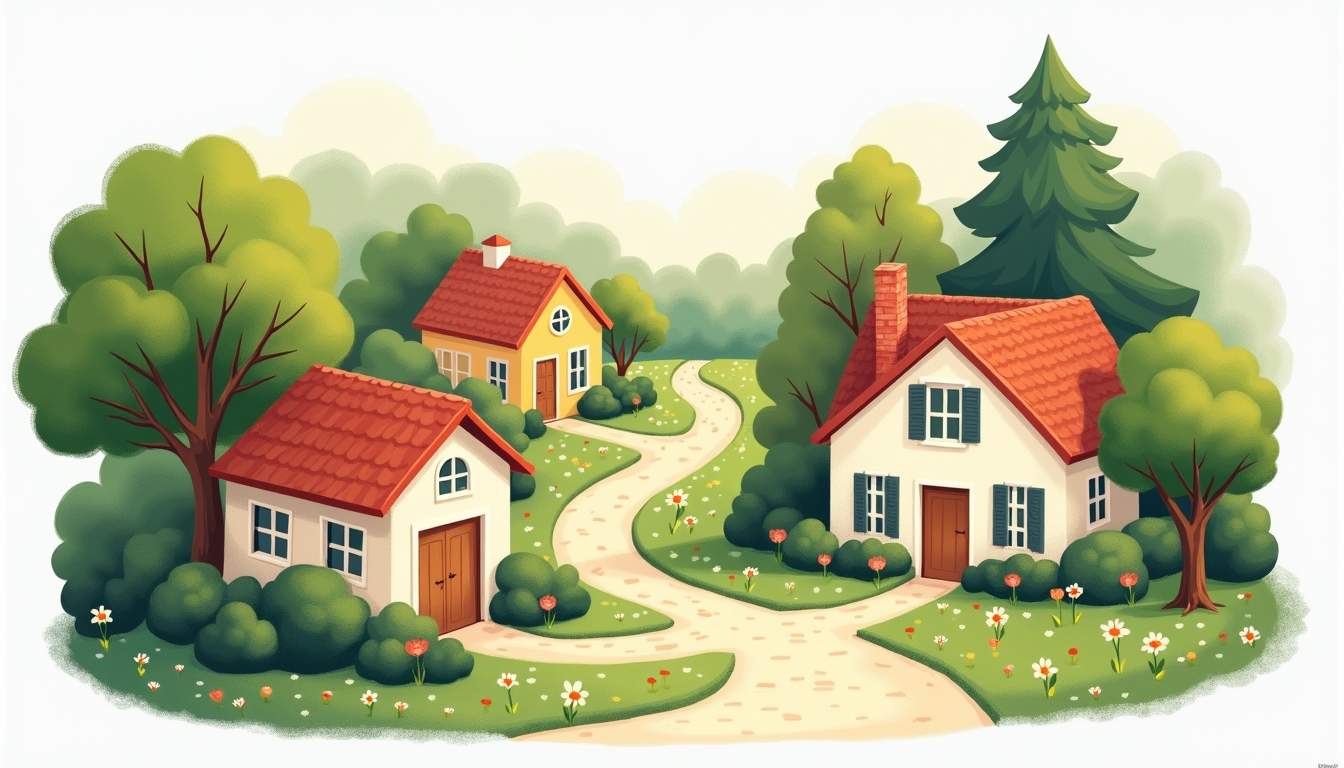
Tucked into the rolling hills and pines of Middle Tennessee, Tennessee National is more than a neighborhood — it is a place where friendships form over backyard fences, clubhouses, and community greens. The design of the development blends comfortable home sites with amenity-rich spaces, while the culture of the place is what turns neighbors into an extended family. Whether moving in for the first time or exploring the area as a weekend visitor, the sense of community is immediate and unmistakable.
The layout of Tennessee National encourages people to meet naturally: sidewalks lead to shared parks, walking trails connect cul-de-sacs, and front porches face streets where conversations can start spontaneously. Streets are intentionally designed to slow traffic and favor pedestrian life, creating safer spaces for families, pets, and strolls at any hour. Public green spaces and pocket parks are sprinkled throughout, giving each cluster of homes a common ground where seasonal events or impromptu gatherings can happen.

Clubhouses and community centers act as focal points for organized activities. These facilities host everything from fitness classes to craft nights, trivia, and holiday celebrations. The calendar fills quickly because residents show up—not out of obligation, but because events are welcoming and enjoyable. The architecture of shared spaces also fosters casual interaction: seating nooks, coffee corners, and multipurpose rooms invite small groups to linger and learn about one another.
Beyond planned events, the community supports spontaneous connections through strategically placed amenities like dog parks, community gardens, and playgrounds. These areas encourage neighbors to cross paths during everyday routines, creating a sense of familiarity and belonging. Seasonal farmers markets and outdoor movie nights further enrich the social fabric by inviting residents outdoors to share experiences in a relaxed setting.
Tennessee National also emphasizes inclusivity by offering spaces that accommodate a diversity of interests and lifestyles. Whether it's a meditation garden for quiet reflection, sports courts for active play, or art installations that inspire conversation, every element contributes to a dynamic environment where everyone feels welcome and motivated to connect.
Design choices were made with social life in mind. A mix of housing styles—from single-family homes to villas—creates diversity in household sizes and life stages, which helps cultivate intergenerational relationships. Streetscapes include benches, street trees, and low-profile fences that maintain privacy while preserving visibility and approachability. Community signs and local art highlight shared identity and pride, reinforcing that this is a place people want to be part of.
Attention to lighting and landscaping further enhances evening and early morning activities, making sidewalks and common areas inviting around the clock. Pathways are wide and thoughtfully placed to encourage walking and biking, reducing reliance on cars and promoting healthier, more engaged lifestyles. Careful integration of natural elements like native plants and water features not only beautifies the neighborhood but also creates soothing environments where neighbors can gather informally.
Tennessee National provides a balance: amenities are plentiful, but the pace remains relaxed. Residents enjoy a well-maintained pool and fitness center, tennis courts, and a golf course that integrates seamlessly into natural contours. For those who prefer quieter pursuits, there are walking and biking trails, community gardens, and scenic overlooks that invite a moment of pause. The amenities are designed to be accessible and useful year-round, accommodating both active lifestyles and slower seasons of life.
Because the community sits outside more congested urban centers, daily routines feel less hurried. Grocery stores, schools, and essential services are within a comfortable drive, but the neighborhood itself encourages people to stay local for leisure and socializing. That local focus strengthens ties among residents and supports small-business vendors who occasionally set up pop-up markets or food trucks during events.
The golf course is a centerpiece, offering playable terrain for beginners and experienced golfers alike. Its fairways and greens double as scenic vistas for walkers and joggers early in the morning or at dusk. Greenways meander through the community, connecting active areas with quiet residential pockets and creating safe routes for children on bikes or families walking dogs. Seasonal outdoor programming—movie nights, holiday parades, and nature walks—makes good use of these shared landscapes, further knitting neighbors together.
Calendar-based community life is vibrant. Annual traditions create continuity: a Fourth of July parade down the main lane, a fall harvest festival with local vendors, and a tree-lighting celebration that draws families together. These rituals are more than entertainment; they become markers of belonging. New residents are welcomed through mixers and neighborhood open houses, which help shorten the time between moving in and feeling at home.
Weekly and monthly events cater to varied interests—book clubs, bridge groups, gardening workshops, and youth sports leagues—so everyone can find a circle that fits. Volunteer committees coordinate seasonal decorations, poolside concerts, and charity drives, offering more ways to contribute and to meet neighbors with shared values. The result is a social ecosystem where participation is encouraged but never forced.
The programming intentionally spans generations. Senior-friendly meetups and walking clubs exist alongside family-oriented events and youth programs. This intergenerational approach creates informal mentorships: retired residents share expertise at DIY workshops; younger families organize playdates and school carpools. The cross-pollination of age groups keeps perspectives fresh and ties stronger, so the community feels multi-dimensional rather than siloed by life stage.
Community life in Tennessee National delivers practical advantages that go beyond social warmth. Home values tend to stay resilient due to strong homeowner association standards and well-maintained shared spaces. Safety measures, including neighborhood watch programs and thoughtful street planning, contribute to peace of mind. The local school districts and transportation links are reliable enough for families to plan daily routines without excessive commute strain.
Maintenance services—lawn care options, trash pickup, and communal snow removal when necessary—simplify life for many residents. For those who prefer hands-off homeownership, property management and maintenance resources make it easier to enjoy the neighborhood without constant chores. Those conveniences are often the invisible threads that keep community life running smoothly.
When life’s small crises occur—sudden car trouble, a last-minute pet-sitting need, or a shared tool for a DIY project—neighbors are frequently the first line of help. A culture of “look out for each other” encourages lending a hand and reciprocating kindness. This mutual support becomes especially evident during larger events, like weather-related disruptions, where residents organize aid, supplies, and check-ins with the vulnerable among them.
The most convincing portrait of Tennessee National comes from everyday stories: a weekly porch potluck that started with two families and grew into fifty, a morning walking group that helped a newcomer find confidence and friends, a holiday committee that surprises senior residents with homemade meals. These stories are not sensational; they are about ordinary human generosity and the way consistent, small interactions build trust over time.
Such moments are common because the community fosters situations where they can happen. Conversations at the poolside café, volunteering at neighborhood clean-ups, or cheering at youth soccer matches create countless opportunities for neighbors to learn each other’s names, interests, and stories. Over months and years, acquaintances deepen into friendships and casual favors turn into dependable support networks.
Informal networks often become formalized when needed: carpool chains for busy mornings, mutual aid lists for families in transition, and skill-sharing directories so one resident can fix what another cannot. These arrangements reduce friction in daily life and create a sense of abundance—a belief that solutions can be found within the community itself. That confidence is a core part of what makes Tennessee National feel like extended family rather than just a collection of houses.
Arriving in a new neighborhood can be intimidating, but Tennessee National eases that transition through structured welcome activities and an open-door social culture. New homeowners often receive a welcome packet with event calendars, group contact lists, and resident tips. Orientation sessions and informal meet-and-greets are scheduled regularly so newcomers can learn how to plug in. Volunteer host families sometimes take the lead, offering introductions and answering questions about day-to-day life.

Getting involved can be as simple as showing up to a weekly class or joining a weekend walk. For those who prefer to take time, the neighborhood’s forgiving rhythm allows one to engage gradually without feeling pressured. Over time, even brief interactions—an exchange at the mailbox, a chat at the farmers’ pop-up, a shared cheer at a community concert—build familiarity and presence.
Simple habits speed the feeling of belonging: attending a couple of events each month, exchanging contact information with next-door neighbors, and volunteering for a short-term committee job. Sharing homegrown produce or baked goods, offering help during a move, and participating in neighborhood social media groups also accelerate friendly ties. The keys are consistency and openness—small, repeated gestures that signal availability and interest in the life of the community.
Tennessee National succeeds because it prioritizes connection without sacrificing individual comfort. Thoughtful design, abundant amenities, and a calendar filled with inclusive events create the conditions for neighbors to become friends, and friends to become extended family. Stability, mutual aid, and regular opportunities for interaction knit the social fabric tightly, while practical conveniences and safety features keep daily life manageable and relaxed.

For those seeking a place where the balance of private life and community belonging leans toward both warmth and convenience, Tennessee National stands out. The neighborhood’s charm is not just in its manicured lawns or well-kept facilities; it is in the way people treat one another, the routines that grow into traditions, and the everyday gestures that make a place feel like home.
Ready to experience a community where neighbors truly become family? Tennessee National invites you to enjoy luxury living in a premier gated neighborhood featuring a Greg Norman Signature Golf Course, private marina, waterfront dining, and more than 20 exclusive member amenities. Whether you seek a move-in ready home or a custom build, our resort-style lifestyle with scenic nature trails and vibrant social clubs awaits. Schedule your private tour today and start making memories daily at Tennessee National.